Modi-Hasina legacy: Golden Chapter?
By Philip Mudartha, Navi Mumbai
Bellevision Media Network
13 Sep 2024:
Preface:
Prime Minister Sheikh Hasina visited India twice within twelve days in June 2024. First, she attended Prime Minister Narendra Modi’s oath-taking ceremony. Second, she paid a state visit at the invitation of Modi. These visits symbolized the high priority that India and Bangladesh accord to one another due to their mutual and organic dependence.
Modi and Hasina share unbroken tenures as PMs since 2014. Their complementarities in governance have deepened Delhi-Dhaka cooperation in existing areas while expanding to include newer areas of collaboration. Sectors that have been at the forefront of their cooperation continued to remain so, such as connectivity and energy, while environmental concerns such as the risk of natural disasters were also prioritized.
Connectivity at the Forefront:
Bangladesh needs India and remains dependent on it in many ways. The first thing that ties Bangladesh to India is its immutable geography. Bangladesh is an India-locked country. This makes Bangladesh dependent on India for both security and trade. It also gives Bangladesh some leverage over India because Bangladesh provides easy and inexpensive connectivity between the north-eastern parts of India and the rest of the country. Thus, Bangladesh is critical for India’s internal connectivity.

Some examples: 1) Maitree Express and Bandhan Express between Kolkata and Bangladesh 2) Mitali Express between Dhaka and New Jalpaiguri 3) Akhaura-Agartala cross-border rail link (distance 10 Km) 4) Maitree Setu, which connects Sarboom in Tripura with Ramgarh in Bangladesh 5) Use of Bangladesh’s Port of Chittagong to transport goods to Tripura.
Sheik Hasina shared the Indian vision of mutual prosperity of both North-eastern states of India and Bangladesh due to improved connectivity in the region.
Consistency in Energy Connectivity:
India made significant efforts to help Bangladesh mitigate its energy challenges.
Some examples: 1) The India-Bangladesh Friendship Pipeline, launched in 2023, is designed to reduce the cost of diesel supply to Bangladesh. 2) India-Bangladesh joint energy projects helped mitigate power crisis in Bangladesh. Round the clock power supplies to Bangladeshi industries, especially Ready-Made Garment (RMG) industry was met by Indian grids so that export targets were achieved. 3) Maitree super thermal power plant in Khulna boosted the country’s power generation capacity. 4) Linking Nepal and Bhutan power grids to Bangladesh through Indian power grids. 5) Rooppur Nuclear Power Plant under joint India-Russia deal.

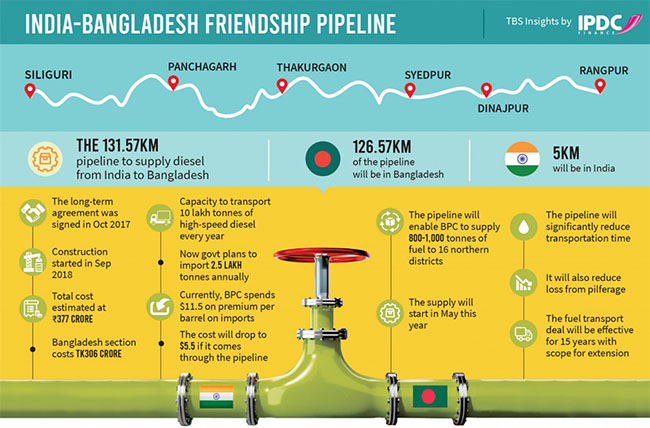
Grievances related to river water sharing:
Under Modi and Hasina, India and Bangladesh experienced “Shonali Odhyay” or golden chapter in their relations. Bangladesh is lower riparian country; naturally its grievances are related to river water sharing. There are 54 rivers which flow to Bay of Bengal from India through Bangladesh. There is a joint river commission but progress is tardy.
During Hasina’s June 2024 state visit, India agreed to invest USD $1 billion in Dhaka’s Teesta River Comprehensive Management and Restoration project. This is aimed at conserving water on Bangladesh’s side of the river. Once implemented, this project is likely to ease the Teesta issue. China made a similar investment offer to Bangladesh but Sheik Hasina awarded the project to India.
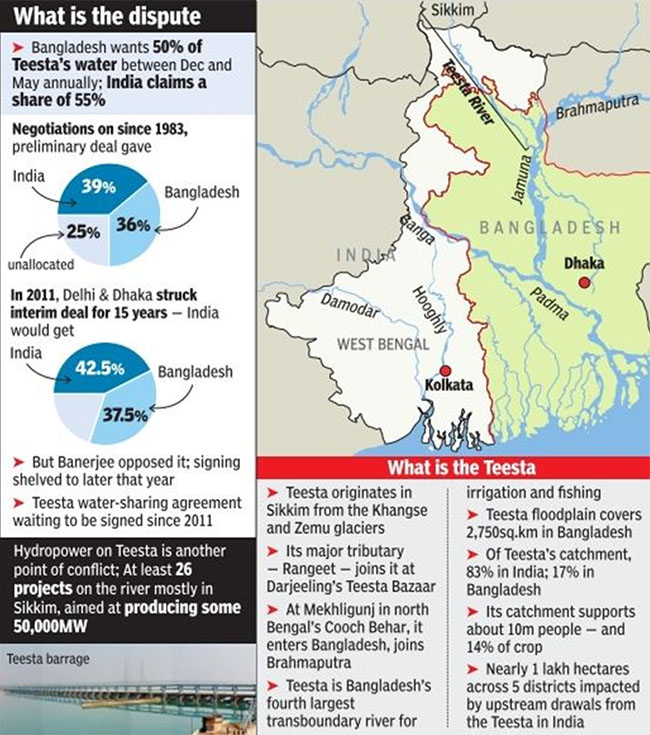
Besides, issues of river water sharing, border trade and smuggling, and tensions over migration and refugees are to be addressed. These issues stem primarily from the shared geography and will never go away. The two nations will have to build a shared understanding and robust institutions to deal with these issues on an ongoing basis.
The India-out sentiment in “New” Bangladesh:
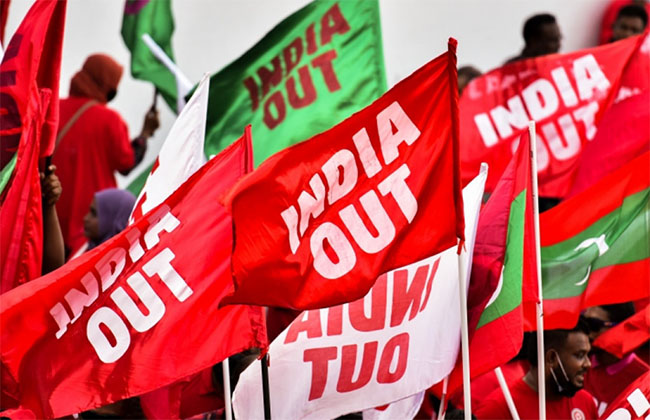
The protestors who toppled her and the interim government in Dhaka believe that it is with Modi’s support that Sheikh Hasina’s regime was able to stay in power for so long. The strong anti-Modi and anti-India sentiments catalysed the demonstrations against Modi when he visited in March 2023.
Muhammad Yunus cannot afford to ignore Indo-Bangladesh relations. He needs to monitor and nurture this relationship carefully. The good start is that Yunus has given Modi assurance that Bangladeshi Hindus will be safeguarded. Yunus deserves credit for not only reaching out to Modi but also for attending the Third Voice of the Global South Summit hosted by India. It signals his openness to and prioritization of a positive relationship with India.
Indo-Bangladesh trade relations:
Bangladesh depends heavily on India for its food security: India supplies rice, wheat, onion, ginger, garlic, sugar and cereals etc. Iron and steel, refined petroleum, electronic equipment, and plastics are some other items Bangladesh imports from India.
Bangladesh’s economic boom is based on the export of ready-made garments to US and EU. This key industry depends heavily on the supply of raw materials like cotton and uninterrupted electrical power from India.
Deterioration of relations with India will immediately result in a decline in exports, a reduction in GDP, higher inflation, and a loss of jobs. Bangladesh cannot afford to break its ties with India.
Geo-political rivalries in South Asia:
In the ongoing contest between India and China for hegemony in South Asia, Sheik Hasina executed her foreign policy based on a hedging strategy to great advantage. Under her, Bangladesh was friends with both and benefitted from both. If the new Bangladesh tilts one way or the other, it will fundamentally alter the regional balance of power.
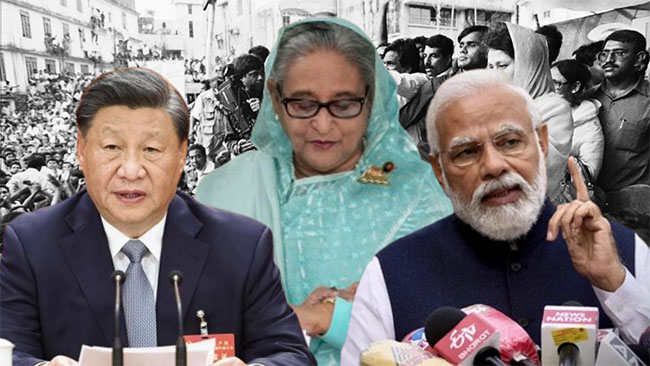
Bangladesh cannot abandon China. China is a major source of investments, imports and Defense procurements. Bangladesh owes China over $6 billion. China has invested over $7 billion in Bangladesh and Chinese exports to Bangladesh in 2023 were over $22 billion. China is Bangladesh’s biggest arms supplier. Bangladesh is as dependent on China as it is upon India.
That said, the absence of a shared border with China gives India a slight edge over China when it comes to dependence. Plus the historical and cultural similarities between India and Bangladesh. It is apparent that India has more soft power than China.
The United States has strategic geo-political interests in the region. For a long time, the US administration has expressed support for regime change in Bangladesh. They were not very happy with Hasina being pro-India or taking support from China. Various strategies have been tried to get her out of power. Opposition activists had been supported to create a revolt. Hasina has faced constant criticism from the US over what they called unfair polls. Many in the region suspect that the U.S. has played a role in Hasina’s ouster. Yunus is seen in many quarters as very pro-U.S.

India had successfully shielded Sheikh Hasina from U.S. pressure. If Bangladesh leans towards India, India will balance China and shield Dhaka from the U.S. But if Bangladesh leans towards China, then both the U.S. and India will start exerting all forms of pressure on it.
Bangladesh is in a delicate geopolitical quagmire, and it needs a delicately crafted foreign policy to navigate to safe harbours. The so-called second revolution is not the solution; it is just a window of opportunity. Will Bangladesh succeed in both crafting a successful reform agenda at home and smart policies abroad? Only time will tell. Its foreign policy work starts with India because it has greater implications for domestic harmony, and admirably Yunus has begun there.
In 1971, Bangladesh emerged as a new nation with India’s help. In 2024 it can again emerge as a new Bangladesh, and again it will need India’s help. PM Modi sure understands that India should preserve the gains of the golden chapter.
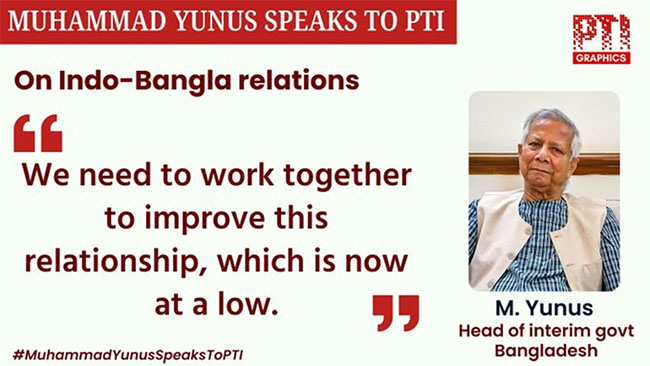
**************************
 Write Comment |
Write Comment |  E-Mail To a Friend |
E-Mail To a Friend |
 Facebook |
Facebook |
 Twitter |
Twitter |
 Print
Print 


















